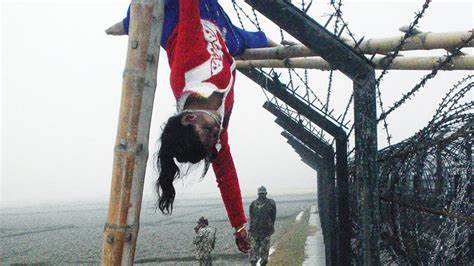Ousted Awami MP Abdul Momen, from the recently dismantled parliament, threatens Bangladeshi people with civil war in a recent article. In the wake of their ouster, the former Awami League government has resorted to a dangerous and misleading narrative to manipulate the emotions of the Bangladeshi people. Dr. A.K. Abdul Momen’s ominous warning of a prolonged civil war is not only an act of fear-mongering but a blatant attempt to sow discord and justify the party’s failures in governance and foreign policy. The truth, however, is far from the fabricated scenario they are painting.
For the past 16 years, the Awami League, under Sheikh Hasina, has maintained a close and arguably subservient relationship with India. During this period, India has not been the friendly neighbor it claims to be. Instead, it has exploited its geographical and political advantages to the detriment of Bangladesh. For decades, India has built dams on over 250 common rivers, severely impacting the lives and livelihoods of millions of Bangladeshis who depend on these water sources. Moreover, India’s long-standing support for the Jana Sanghati Samiti (JSS) in the Chittagong Hill Tracts (CHT) has only fueled unrest and violence, leaving Bangladesh grappling with internal strife.
The Awami League’s allegiance to India has done little to benefit the people of Bangladesh. Instead, it has allowed India to meddle in the country’s internal affairs, all while maintaining the facade of a diplomatic partnership. The support India has provided to the Awami League is not rooted in a desire for mutual prosperity, but rather in its own strategic interests. For years, India has backed the Awami regime, turning a blind eye to its autocratic tendencies, the suppression of political opposition, and the alleged involvement in the killing, abduction, and looting of Bangladesh’s wealth.
Now, as the regime crumbled, the same leaders who once claimed to champion democracy and sovereignty are concocting a narrative of impending civil war. They argue that external forces, primarily the United States, are conspiring with internal actors to destabilize Bangladesh. Yet, it is their very actions, driven by a desperate need to maintain power, that pose the greatest threat to the nation’s stability.
Debunking the Myth: St. Martin’s Island as a U.S. Military Base
The claim that the United States has long desired to establish a military base on Bangladesh’s St. Martin’s Island is not only baseless but also logistically implausible. This narrative, often propagated by those with a vested interest in stoking fear and distrust, overlooks the practical realities of the island’s geography and strategic value.
St. Martin’s Island, while picturesque, is fundamentally unsuitable for hosting a military base of any significant scale. One of the key reasons for this is the shallow depth of the surrounding waters. The sea around St. Martin’s Island is not deep enough to accommodate large warships, a critical requirement for any military base intended to project power and maintain a substantial naval presence. This has been a consistent point raised by experts whenever this claim resurfaces.
A military base, especially one that is intended to serve the interests of a superpower like the United States, requires deepwater ports that can support the docking of aircraft carriers, destroyers, and other large naval vessels. St. Martin’s Island lacks this capability, making it an impractical choice for such a strategic installation. Furthermore, the island’s small size and remote location further diminish its strategic value, making it an unlikely candidate for a base from which the U.S. could project power in the region.
Experts in maritime strategy and defense have repeatedly refuted the notion that St. Martin’s Island could serve as a viable military outpost. The logistical challenges, coupled with the island’s limited infrastructure, render it an unfeasible option for a base. The persistent claims to the contrary appear to be part of a larger misinformation campaign aimed at sowing discord and distrust, rather than reflecting any genuine strategic considerations.
Tone change on Zia
The Awami League, known for demonizing BNP founder Ziaur Rahman, is now attempting to portray him as a patriot to support its civil war narrative. In his recent article, Abdul Momen claimed that after losing Talpatti Island, America tried to pressure Ziaur Rahman into allowing an American military base on Saint Martin’s Island. According to Momen, Zia refused, leading to U.S.-backed propaganda within the military, which supposedly fueled Zia’s assassination and the subsequent persecution of freedom fighters. This contradictory portrayal serves the Awami League’s current agenda, distorting historical events to justify their narrative.
Mr. Momen also asserted that America then supported General Ershad, who had court-martialed Bengali soldiers opposing Pakistan during the Liberation War, leading to a pro-Pakistan and pro-American tilt in the Bangladeshi military. Ershad’s government, however, faced early public dissent due to Zia’s legacy and Sheikh Hasina’s rising influence. Consequently, America’s plans for a military base on Saint Martin’s Island were stalled. Following Ershad’s fall, the U.S. attempted to deploy troops to Bangladesh under various agreements, including “SAPTA,” and even tried to send a troop carrier ship to Chittagong during the Uri Char disaster in Khaleda Zia’s first term.
Mr. Momen supported India’s position, stating that Pakistan and China are adversaries of India. He noted that India disapproved of Sheikh Hasina’s recent efforts to strengthen ties with China. Nonetheless, given Bangladesh’s extensive 2,000-kilometer border with India, India opted to keep a cautious yet stable relationship with Bangladesh. According to Momen, as long as Bangladesh’s leadership does not align with India’s enemies, India remains satisfied.
In a bid to further ingratiate himself with his former patrons in India, Mr. Momen has concocted elaborate and speculative narratives. He suggested that America, through Dr. Yunus, established an illegal interim government in Bangladesh, violating laws and using military force. According to Momen, Dr. Yunus allegedly threatened India and China with destabilization in the Seven Sister states and Rakhine in Myanmar. He claims that this supposed conspiracy involves a plan to create a Kuki-Chin state and an Arakan state, using Bangladesh as a base and employing Pakistan’s ISI agents to sever India’s Seven Sister states.
Momen’s depiction suggests that India might be compelled to preemptively attack Bangladesh to protect its territorial integrity, much like Russia’s actions in Ukraine. He envisions a scenario where communal conflict erupts within Bangladesh, pitting anti-India Islamic fundamentalists against Hindus and secular intellectuals, while America purportedly supplies weapons and troops, leading to a civil war where Bangladeshis fight among themselves. However, Momen conveniently omits key details, such as the fact that two of Sheikh Mujib’s grandchildren, Tulip Siddiq and Sajib Wajed Joy, are married to Jewish individuals.
A dangerous exaggeration
The idea that Bangladesh is on the brink of a devastating civil war, with millions at risk of death and the country’s infrastructure on the verge of collapse, is a dangerous exaggeration meant to instill fear and distract from the regime’s failures. The suggestion that India might be forced to invade Bangladesh to protect its interests is a thinly veiled attempt to portray the Awami League as the only barrier against chaos.
However, the reality is that the Awami League’s fall from power is a result of its own mismanagement, corruption, and failure to address the needs of the Bangladeshi people. The threat of civil war is not an inevitability but a manufactured crisis, a last-ditch effort by a fallen regime to cling to relevance.
India, which has never truly established a relationship with the Bangladeshi people, should not be seen as a savior or an ally in this scenario. Its historical actions—supporting insurgencies, exploiting natural resources, and propping up autocratic leaders—reveal its true intentions. The Bangladeshi people must remain vigilant and reject the propaganda being spread by the ousted Awami League. The future of Bangladesh lies in the hands of its people, not in the manipulative tactics of a discredited regime or the strategic interests of a neighboring state.










